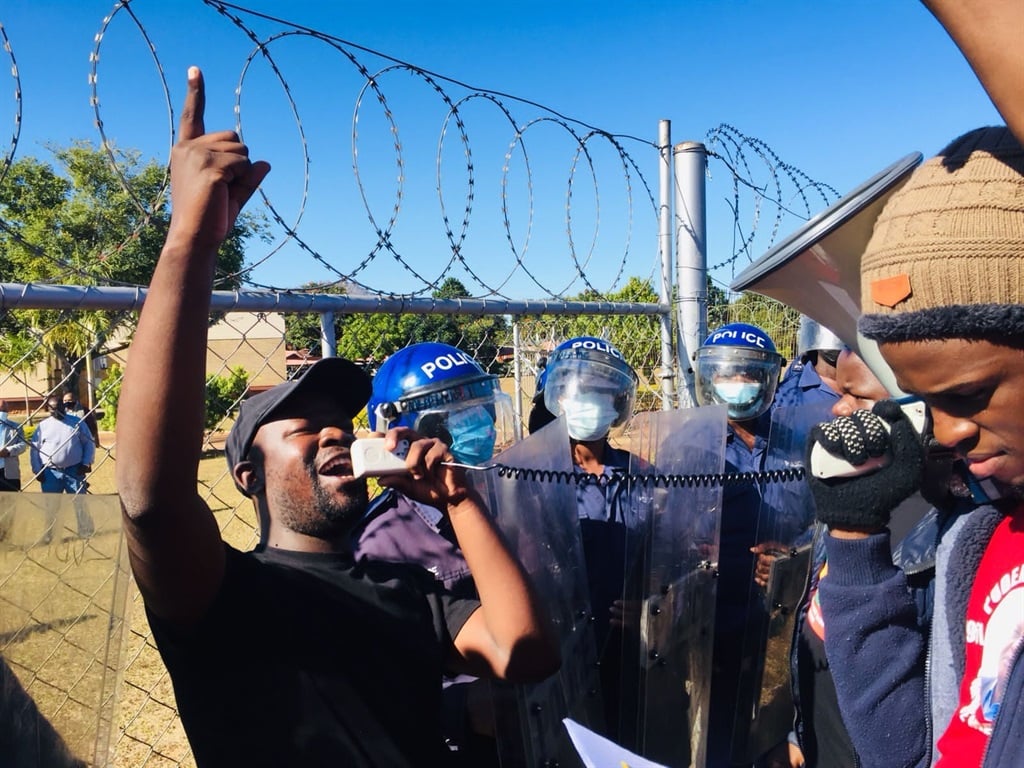
- Civil society groups have accused the eSwatini government of handpicking groups to meet with a SADC delegation.
- One pro-democracy MP said he was called at the last minute after SADC delegates asked to speak to him.
- A SADC delegation travelled to eSwatini to discuss the ongoing protests in the country.
Members of several eSwatini civil society groups "gatecrashed" a meeting between the Southern African Development Community (SADC) and the eSwatini government, after they were excluded from diplomatic talks over the crisis there.
The SADC Organ on Politics, Defence and Security met acting Prime Minister Themba Masuku on Sunday. The SADC Troika also met with members of civil society, including church groups and non-governmental organisations, to discuss deadly protests in eSwatini. The SADC Troika was led by Botswana's Minister of International Affairs and Cooperation, Lemogang Kwape. South Africa's Minister of International Relations and Cooperation, Naledi Pandor, also attended the meeting.
A number of civil society groups accused the eSwatini government of handpicking civil society groups, and excluding those who are calling for multi-party democracy in Africa's last absolute monarchy. A member of parliament, forced into hiding after he called for elections, said the eSwatini government tried to rush a last-minute meeting with him at the behest of SADC delegates.
The eSwatini government did not respond to requests for comment and SADC referred News24 to Masuku's office.
Civil society groups hand-picked
Progressive civil society groups had prepared a statement for the SADC delegation, outlining the political crisis in the country.
"We would like to point out [to] the delegates and the international community that the current turmoil in the country, showing up as social and economic upheavals leading to violence and insecurity, are a result of [a] longstanding political stalemate," 20 groups said in a joint statement.
In the joint statement, they called for a transitional authority, which would oversee eSwatini's reform towards credible elections. They also raised concerns about the army's ongoing presence in the streets. The groups include the Foundation for Socio-Economic Justice, the Federation of eSwatini Business Community, the Trade Union Congress of Swaziland and other political and civil movements.
Still, the groups are unclear on whether the SADC summit received their statement, said Thuli Makama, of the Institute of Democracy and Leadership (Ideal) – one of the signatories to the statement.
Civil society groups said they "caught wind" of the meeting, instead of receiving a formal invitation.
"Government made the selection," Makama told News24.
Ideal and other groups "gatecrashed" the meeting, said Makama, forcing SADC to adjourn the meeting until all stakeholders could be at the table.
'People are dying'
eSwatini member of parliament Mduduzi Simelane said he was invited to participate in a telephone call with SADC late on Sunday. Simelane is among three members of parliament who are calling for representative elections in eSwatini. He told News24 that he has been in hiding since the protests began last week.
Simelane said he was unable to talk to SADC delegates directly and spoke to the eSwatini government's Ministry of Foreign Affairs instead.
"They said they are hosting Troika, and Troika is requesting to talk to me via a phone call, most preferably a WhatsApp call so that they can identify my face," said Simelane.
"And my answer to them was, as they have stayed the whole day with the government, I expect them to give us time, the forces of change, to meet us over the table and listen to our grievances and our side."
Simelane added that he was told that the Troika was in a hurry, and promised to adjourn the talks to a later stage.
"It was surprising, it was heartbreaking because their trip here had urgency because people are dying," Simelane said.
The News24 Africa Desk is supported by the Hanns Seidel Foundation. The stories produced through the Africa Desk and the opinions and statements that may be contained herein do not reflect those of Hanns Seidel Foundation.
